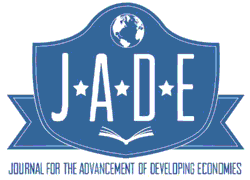Institute for the Advancement of Developing Economies

Journal for the Advancement of Developing Economies
Date of this Version
2014
Document Type
Article
Citation
Journal for the Advancement of Developing Economies, Volume 3, Issue 1, 2014
doi:10.13014/K25X273X
Abstract
Land is the most important natural resource that affects every aspect of human life, while biodiversity constitutes the most important working component of a natural ecosystem. Land use and biodiversity are agricultural and ecological challenges presently facing Nigeria in her efforts at addressing the issue of agro-ecosystem transformation and sustainable land productivity. This study employed secondary sources of information to assess land reform act in Nigeria, the methodological framework to analyze the linkages between land use change and biodiversity, effects of land use on biodiversity, status of biodiversity and suggests ways to solving land use problems and biodiversity loss. Findings revealed climate change, invasive species, land conversion due to ignorance and high level of poverty as some of the drivers of biodiversity loss in Nigeria. Nigerians are altering the natural environment through continuing agricultural expansion and practices (conversion of forests to cultivated areas) although with the introduction of government-led Presidential Initiative Afforestation programme nationwide for regeneration. While competing land uses for agriculture and human settlements, rising demand for fuel wood and charcoal are contributing to the decline of forest and woodland areas; over-harvesting of resources and unregulated burning are also contributing to the decline of many species in the wild. In order to effectively implement many agreements, Nigeria had signed treaties with other international communities on conservation and sustainable use of biodiversity that conservation should be integrated into all forms of land use to promote cross-sectional cooperation among land users. It is imperative to check the pressures on protected areas in order to stem the tide of biodiversity loss. Planning for land use sustainability must consider the multiple and often competing environmental, economic and social values of a wide range of the public, decision makers, and interest groups.
Included in
Econometrics Commons, Growth and Development Commons, International Economics Commons, Political Economy Commons, Public Economics Commons, Regional Economics Commons


Comments
Copyright 2014 JADE